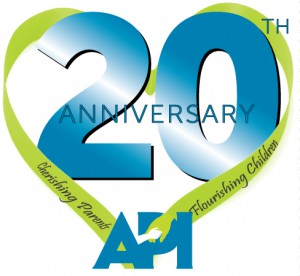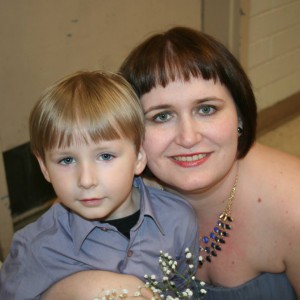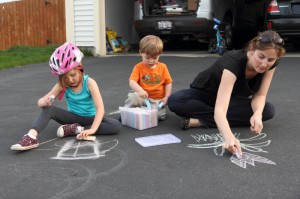Tag: API
A working mom seeks balance
Editor’s note: This post was originally published on October 7, 2008, but it gives timeless tips to working mothers struggling to feel balanced.
Guest post by Annie, PhD in Parenting
Just about every mother suffers from it, but there is no cure. It seems no matter how much we give, how hard we try, in our own minds it isn’t enough.
Some days I feel like a do a pretty good job of balancing my career, my family and myself. But other days, it feels like I’m falling desperately behind and failing on all three counts.
As a society, I often get the impression that we are slipping behind. That families have less and less time to spend together. It used to be that Sundays were sacred family time, and now some people work Sundays while others use it to get chores done. It used to be that mom was waiting at home with freshly baked cookies when the kids hopped off the school bus, and now kids are in after-school care programs while waiting for Mommy or Daddy to finish the work day and hurry off to collect the kids. But according to an article in the Washington Post, maybe we’re not doing as badly as we think:
In 1965, mothers spent 10.2 hours a week tending primarily to their children — feeding them, reading with them or playing games, for example — according to the study’s analysis of detailed time diaries kept by thousands of Americans. That number dipped in the 1970s and 1980s, rose in the 1990s and now is higher than ever, at nearly 14.1 hours a week.
So if we are spending more time than ever with our kids, why do we still feel so unbalanced? Why do we all feel like we’re not doing enough with our kids — or at work, or for ourselves?
I think part of it is that society tells us we need to achieve balance. We need to spend quality time with our kids. We need to get recognized and promoted at work. We need to be perfect wives. And we need to carve out time for ourselves. If we fail on any of those fronts, the guilt starts again.
I haven’t found a perfect solution, but I’ve learned a few things along the way that make it easier, that make me feel like I’m progressing in finding that balance and in particular in being more present for my kids, which is the most important element of the balance for me:
- Finding a new job — When my son was born, I decided that I couldn’t let someone else set my priorities any more. So I started my own business, where I get to decide how to balance my family and my clients, I decide how much work to take on and I decide when enough is enough.
- Taking advantage of the time we do have — There are things that are part of our daily routine where I could shut my kids out, but where possible, I try to bring them in. My son likes to help me bake and cook, so I try to get him involved in meal preparation. It helps him learn how to get around a kitchen and also gives us some extra special time together. I drive my son to school each day and pick him up, a total of about an hour in the car together each day. We have developed a repertoire of games and conversations that we have, and I really cherish this time. Instead of leaving my daughter at home with my husband while I do the grocery shopping, I take her with me and talk to her as we go through the aisles. Sometimes it makes these tasks take a little longer and makes it more hectic, but I think it is worth it in the end.
- Cosleeping — I have heard so many working parents complain about how little time they have with their kids during the week. Some parents arrive home from work at 6 p.m. and have their little ones in bed by 7 p.m. We do manage to sneak in more than an hour of time together in the evenings. Usually I end up having close to three hours with my kids at home before bedtime. But being together doesn’t end there. I share a bed with one or the other of my kids every night. I find this time to be an essential way of staying close, even when we can’t spend as much waking time together as we would like. As I sit here and type, my daughter is sleeping on a boppy pillow on my lap.
- Planning dates with my kids — I try to set aside some special dates with my kids. Sometimes my husband brings my daughter in to meet me for lunch. Every once in a while my son and I go out for an early dinner after school before going home. On weekends, I try to carve off half days to go out and do special activities like a walk or a visit to a museum with one or both of the kids. In the summer, I take Mondays off and often spend the day out and about with one kid or the other, going to the park, stopping at a cafe for a snack, visiting the bookstore, having an ice cream, etc. When we just stay home and hang out, we do get some time together but that is often combined with doing the laundry, checking e-mail, cooking meals, cleaning up and all the other things that get in the way of focusing on each other, and we definitely have no time for this and want to do other activities like going out, we better get the Cleaning Services Edmonton to help us with chores and have more time for other activities.
- Reading, reading and reading some more — Reading is a way of sharing stories and ideas. Reading promotes literacy. Reading lets parents and children bond and gives them a stepping off point to discuss feelings and topics of importance, to develop hobbies, to laugh together. We read to our kids every day and even when everything else is falling apart, I try to keep this as a constant. We have books everywhere in the house. We have books in the car. We have books in the diaper bag. Anywhere we go, we have books.
- Accepting less than perfect in other areas of life — I’m lucky to have a husband that helps out a lot around the house. He is a stay-at-home dad and he has also taken on a lot of the household chores. But among the chores that we share or that I do, I’ve accepted that I don’t need to be perfect all of the time. Sometimes I get my daughter and I dressed all week out of an unfolded and unsorted hamper of clean clothes. Often I pay the bills once per month, rather than paying them as they arrive or paying them at the “best” time as per due dates and interest rates. I started out making my own baby food, but then gave up and went for store-bought instead. My hair looks better when blow dried, but except on the coldest winter days or the most special events, I leave the house with wet hair.
- Striving for balance over time, not every day — I work really hard at some times of the year, often working several hours at night after the kids are in bed, but I also take almost two months of vacation each year that I spend exclusively with my kids. Sometimes I take a night to go out with friends, but at other times if my kids need me, I may have to put social activities on hold. Some weekends I need to work, and sometimes I take a long weekend so that I can focus on family. If I try to achieve perfect balance each day, I will fail. But if I let things work themselves out over time, I may have a fighting chance.
All that to say that I don’t have the cure for mommy guilt. Not even close. But I’ve discovered a few tricks that help me give my kids more presence within the constraints of our ever busy lives. What tricks have you discovered to spend more quality time with your kids while maintaining your career?
Generation AP: An interview with Autumn McCarthy
 In celebration of Attachment Parenting International’s 20th Anniversary, this second of the two-part “Generation AP” series (read the first part here) continues to recognize today’s second-generation Attachment Parenting parents:
In celebration of Attachment Parenting International’s 20th Anniversary, this second of the two-part “Generation AP” series (read the first part here) continues to recognize today’s second-generation Attachment Parenting parents:
“I like how my parents approached parenting. They never did anything to hurt us. They always did whatever they did out of love or with the best intentions. I don’t think there’s much to improve upon. I just hope I can be like them. “ ~Autumn McCarthy
For some parents, Attachment Parenting is a whole, new frontier of relating within the family. We are learning from the ground up. For others, Attachment Parenting (AP) comes as naturally as breathing. That’s how it was for Autumn McCarthy of Plano, Texas, USA, the API Leader of Collin County API in Dallas-Fort Worth, Texas, and a second-generation AP parent. Additionally, she is a licensed clinic social worker, personal life coach and a La Leche League leader.
RITA: Thank you, Autumn, for your time. Let’s start by reviewing how your parents practiced AP.
AUTUMN: My parents have six living children. They practiced Attachment Parenting by having the family bed, breastfeeding, babywearing and practicing gentle discipline. They also pretty much took us with them wherever they went. They included us in whatever they had to do.
RITA: It sounds like your parents used many of the techniques associated with AP. How did your parents help you through strong emotions like anger and disappointment?
AUTUMN: They let my emotions be my own. They didn’t react. They didn’t take things personally. They let me express myself even if I wasn’t doing it in the “right” way or the healthiest way or the least destructive way.
I remember once telling my parents, “F*** YOU!” at age 15 right after my grandfather died. Crazy times! And they recognized it for what it was: a teenager full of crazy emotions not knowing how to express them. They didn’t flip out at me for being super disrespectful. They helped me to understand and express myself better.
RITA: That’s a wonderful example of allowing, empathizing and validating your emotions and then coaching and empowering you to be able to learn from the experience. Did you ever feel that the way your parents were raising you was different than how your peers were raised?
 AUTUMN: I knew from an early age that my parents raised me and my siblings differently from other parents. One of the most interesting things to me was seeing how my parents handled us growing up and turning 18 versus other parents.
AUTUMN: I knew from an early age that my parents raised me and my siblings differently from other parents. One of the most interesting things to me was seeing how my parents handled us growing up and turning 18 versus other parents.
I’d say, growing up, my parents were stricter in some areas. There were just more rules or expectations, like we weren’t allowed to spend the night at just anywhere. I think there were maybe two friends in all of growing up that I could stay the night with. But then as we got older, my parents really believed that we were able to be independent and that, although there was an expectation for mutual respect especially while living in the same house, there weren’t additional rules. Once we turned 18, we were considered adults and treated as such—trusted by my parents.
My friends tended to have a little more flexibility growing up—less rules—and then the second they turned 18, it was like their parents got super strict, placed a ton of rules on them like when and where they could go, when they had to be home, etc. Hanging on for dear life to their kid while my parents happily watched us independently fly on our own.
RITA: That’s an interesting observation. So did you find it natural to practice AP when you became a parent?
AUTUMN: Yes! When I was pregnant and working, I kept negotiating with myself and my husband for how much time I could stay home. I kept increasing the time line: “If he’s been with me, growing inside me, for 9 months, it would be crazy to not be with him for just as long once he’s born!” On paper, there was no way my staying at home could work, but it has worked in a practical way for almost four years. It hasn’t been easy, but the confidence in knowing I am meant to be right here with him has helped tremendously with the decision.
Attachment Parenting has been mostly intuitive for me. Being with my baby, feeding my baby from my breast despite the troubles I initially had, providing care based on his cues and needs. Attachment Parenting has so many parts to it, and it can look so many ways. For us, this has meant bedsharing, breastfeeding and trusting my son when he “tells” us what he needs from us.
The gentle discipline part is the most challenging for me.
RITA: How so?
AUTUMN: Gentle discipline is a challenge for me. I think I’m my own worst critic, of course.
We do gentle discipline, but I find it a challenge to not yell. We mess up all the time and apologize and explain what we did wrong and how we should have done it differently. I am trying to express my feelings and name my emotions for him. He’s now been able to do the same when he’s upset.
It’s a challenge for sure, and I wouldn’t want to use any other type of discipline. I just judge myself and whether I could have been better, more gentle.
RITA: Many parents feel they need to improve upon how they were parented in some way, but it sounds to me like how you were raised didn’t leave you with that impression?
AUTUMN: My son is almost 4. I feel like so far I’m parenting much like my parents did. Looking at all of us now, I can only hope that I parent Noah in such a way that he has a relationship similar to what my siblings and I have with my parents.
I think my parents did the best they could. I don’t think it was always right or necessarily wrong. It just was what it was. I see that now as a parent myself. Sometimes I mess up. Sometimes I could have done it better or differently, but it doesn’t mean I did it right or wrong in that moment.
I like how my parents approached parenting. They never did anything to hurt us. They always did whatever they did out of love or with the best intentions. I don’t think there’s much to improve upon. I just hope I can be like them.
RITA: Do you receive a lot of support from your parents?
AUTUMN: Yes! My parents are some of my biggest support people. They love seeing us raise Noah in a similar way to how they parented. They feel it is so beneficial to the child, so they are happy to see their grandchild benefitting from us raising him in this way!
RITA: And what about your partner—what does he think about AP?
AUTUMN: My husband did not grow up with Attachment Parenting. It was a new concept to him when we had our son.
My husband has been supportive of Attachment Parenting. He has seen the benefits to it for not only our son, but for us, too. When Noah was 1 1/2 years old, our wedding anniversary was coming up, and I told my husband that we should get a friend to watch him at our house so we could run up to dinner nearby or something. My husband replied, “No, that’s OK. I don’t see why we can’t just celebrate with him.” I had to laugh—my husband had become an AP parent!
My in-laws have been respectful of our parenting decisions even though the way we parent differs from the way they parented. We have addressed some of these differences by explaining why we parent the way we do and what would be most helpful to us in terms of ways to support our attached family.
RITA: Thank you, Autumn, for your insights. Parenting is such a journey, and I think every parent—no matter how experienced—is always learning. Plus, children are constantly changing and some development changes are harder or easier for some parents than others. How do you feel about parents who struggle with AP?
AUTUMN: In my experience, I find parents who are struggling are either basing Attachment Parenting off of misinformation of what it is or are putting too much pressure on themselves. Usually, they have an idea of what AP is and it’s usually a very defined, very specific picture of parenting.
I feel compassion and love for parents who are struggling with AP or anything else for that matter. I am a parent that struggles on a daily basis to parent my child how I want to. I think it’s part of parenting regardless of the type of parenting one follows. I will usually try to offer a different perspective or a tip or tools to try if they are open to ideas.
Parenting is hard, period.
Generation AP: An interview with Patricia Mackie
 In celebration of Attachment Parenting International’s 20th Anniversary, this first of the two-part “Generation AP” series (read the second part here) recognizes today’s second-generation Attachment Parenting parents:
In celebration of Attachment Parenting International’s 20th Anniversary, this first of the two-part “Generation AP” series (read the second part here) recognizes today’s second-generation Attachment Parenting parents:
“When I experienced major emotions, I would just shut down. My mom would sit with me for hours and wait for me to talk.” ~Patricia Mackie
Attachment Parenting is no one-size-fits-all childrearing formula: It’s about having a warm, joyful relationship with our children built on the foundation of sensitive responsiveness, empathy and trust. The need for a secure attachment is instinctually programmed into each of us so that we’re continually striving toward it, whether we recognize it or not. Every parent is on their own parenting journey, and all parents are doing the best they can with the knowledge and support available.
Still, it’s reassuring to know that we’re not the first generation to practice Attachment Parenting (AP).
At the time of this interview, Patricia Mackie of Naperville, Illinois, USA, was just a few weeks away from her third baby’s birth. Patricia is a passionate API volunteer and devotes time to several API projects, including Naperville API in Illinois as an API Leader, the Professionals program, the Editorial Review Board, the API Warmline and the Journal of Attachment Parenting. In addition, Patricia is a marriage and family therapist, author of the “Three’s a Crowd” course for expectant and new parents, and founder of Connecting 1 Day at a Time for couples with children.
RITA: Thank you, Patricia, for squeezing me into your busy schedule, especially with baby coming soon. Let’s start by reviewing how your parents practiced AP.
PATRICIA: My parents grew into it. They practiced more Attachment Parenting with me than they were with my older sister. For the most part, they followed all of the principles.
We were very involved as a family in cooking and growing our own food.
I have great pictures of my dad with me on his back. Both of my parents wore me as a baby, more so when we were out and about than when we were at home.
They were also sensitive to us during sleep. Mom said I would not sleep in her arms. She would rock and nurse me for hours waiting for me to sleep. Then, she put me in the bassinet and I was out. My sister and I had our own beds, but my parents’ bed was always open for my sister and me.
My mom tried to do as much positive discipline as she could, but she was really young when she had children and didn’t have much support. She went through trial and error as all parents do.
 RITA: It sounds like you had a family-centered lifestyle growing up. Please share a couple of your favorite memories.
RITA: It sounds like you had a family-centered lifestyle growing up. Please share a couple of your favorite memories.
PATRICIA: I grew up in Alaska, and Mom’s favorite thing to do was to go to this little pull-off on the road, Beluga Point. Sometimes when we were having a hard day or a really good day, or just because, we would go for a drive, get Subway sandwiches, go to Beluga Point, and sit and eat and watch the ocean and the mountain sheep. Sometimes Mom would go with both me and my sister, sometimes it was just me and Mom, but it was a connection point for us.
When I was 4, my parents bought a cabin and we would go up there every weekend. It was our family time—time with everybody together, to play together, to work together, another connection time.
RITA: It’s important for families to spend time together in a positive environment. How did your parents react when emotions were not so positive? How did they respond to strong emotions in you, such as anger?
PATRICIA: It was an area of growth for my parents, but my mom had a way of knowing what to do.
When I was 7, I ran my bike through a stop sign and there as a police officer who saw me. I think I scared him as much as he scared me, but he apparently wanted to make an impression and turned on his lights and yelled at me to slow down and watch what I was doing. He scared the daylights out of me! I came home really upset. Mom knew something was going on but didn’t know what, and I wasn’t talking. So she sat down with me and encouraged me to talk about it.
When I experienced major emotions, I would just shut down. My mom would sit with me for hours and wait for me to talk.
RITA: Is this what influenced your career in counseling?
PATRICIA: Growing up, my parents thought I’d end of in one of two careers: either a lawyer, because I was really good at arguing, or a therapist. At school, there was this little hill where I liked to sit. And my friends would come and sit and talk with me when they needed someone to talk to.
It felt so good to talk and be listened to. I grew up learning that when you have a hard time, you talk about it. It’s so simple and yet the very last thing we think about.
When I was a teenager, I had a negative view on life, and was difficult to be around. But every day, my mom and I would have afternoon tea. I didn’t have to drink the tea or eat cookies, but I couldn’t get up from the table until I talked about what was going on. If I had a rough day, she helped me to look at the positives and to stop dwelling on the negatives. That was her way of teaching me without making me feel worse.
My mom also encouraged me in a way that she didn’t realize My sister and I had a very hard relationship growing up. We don’t see the world through the same eyes. Mom would threaten us, but never follow through, for us to either stop fighting or she would take us to therapy. I always wanted to go to therapy, because then my sister and I could learn to talk to one another.
Another big influence was my grandmother. She died when I was 12, and this really affected me. We had a very special relationship. It was from her that I grew up with high values for marriage and that you don’t give up on marriage.
RITA: Did you ever feel that the way your parents were raising you was different than how your peers were raised?
PATRICIA: I knew when I was very young that I was very lucky to have the parents I have, though I didn’t know why. I would go to sleepovers at friends’ houses and would be shocked to hear their parents fighting in the next room, or when one of the parents would ignore the other parent.
RITA: Hmm, that’s interesting. So did you find it natural to practice AP with your own children?
PATRICIA: I was practicing Attachment Parenting before I knew what it was. To me, there was no other choice.
I remember one visit to the doctor and he asked me if I was going to breastfeed. I said, “Yeah.” And he put down his notebook, turned to me and said that in all his years of practice, not one time did a mother said ‘yes’ that they would breastfeed without a second thought. They all said they would try.
However, positive discipline has been a challenge. My mom did some spanking when I was young, and she made threats. My mom didn’t get into the groove with positive discipline until I was a teen.
All the things that make my daughter a wonderful person also make it hard during discipline, just like I was for my mom. That’s the hardest part of raising her: She’s me.
My son is very different: very laidback, go with the flow. I thought my daughter was an easy baby, and then my son was born and I realized, oh, she was a high-needs baby.
RITA: Many parents are plagued by the desire to be perfect in their parenting. How do you feel about parents who struggle with AP?
PATRICIA: It’s natural to struggle. I don’t think that everything in parenting comes naturally. I think of my sister. She doesn’t have that natural instinct to pick up her babies and snuggle with them. Some people don’t. We all struggle at some points.
RITA: When did you find API and learn that what you’re doing is AP?
PATRICIA: When I needed support because my daughter wouldn’t sleep, I would go online and search the mommy boards looking for answers. I was reading all the horrible stuff that people do to their kids and was thinking, I need to find people who think like I do.
RITA: Now that you have a name for your parenting approach, how do your parents feel about Attachment Parenting?
PATRICIA: Because my sister lives closer to my parents than I do, and she does not practice Attachment Parenting, they are more familiar now with her parenting style than mine. But they are very supportive of me, and we are able to talk about our differences in parenting views.
RITA: And what about your husband—did he come from an AP family, too?
PATRICIA: No, at all. He was an only child, and he had no experience with children or babies whatsoever. But he has always been very much okay with what I do.
It’s hard with his parents. Over the years, though, they’ve grown very curious about Attachment Parenting. They’ve accepted that’s the way we do things, because clearly it’s working.
RITA: Thank you, Patricia, for your insights. One final question: What is a way that others can see the effects of Attachment Parenting?
PATRICIA: All of my daughter’s preschool teachers say they can’t believe how empathic she is. She’s not trying to please anyone. She’s just aware of everyone’s emotions and readily goes to comfort an upset child.
Thank you, Courtney!
 In the past 20 years since Attachment Parenting International was cofounded by Lysa Parker and Barbara Nicholson, the nonprofit organization has been a way for parents to join together as volunteers to give a voice to and further the Attachment Parenting movement. API has been blessed with amazingly dedicated volunteers — mothers and fathers and grandparents who have given of their time, talents and skills to the cause. Today, Attachment Parenting has become a household name and, even if not always attributed by name, API’s Eight Principles of Parenting are now incorporated into much of mainstream parenting and childcare trends. We are making a difference!
In the past 20 years since Attachment Parenting International was cofounded by Lysa Parker and Barbara Nicholson, the nonprofit organization has been a way for parents to join together as volunteers to give a voice to and further the Attachment Parenting movement. API has been blessed with amazingly dedicated volunteers — mothers and fathers and grandparents who have given of their time, talents and skills to the cause. Today, Attachment Parenting has become a household name and, even if not always attributed by name, API’s Eight Principles of Parenting are now incorporated into much of mainstream parenting and childcare trends. We are making a difference!
Courtney Sperlazza, a mother with a big heart and a passion for blogging, is one of these mothers who, for the last couple of years, has given of her free moments to serving as the Editor of APtly Said, the blog of Attachment Parenting International. APtly Said offers an opportunity to any parent who is practicing Attachment Parenting to write about their everyday experiences. The blog provides a place, along with all of API’s publications, to nurture writers, beginning or experienced, not only in furthering their parenting philosophies with the AP approach but also in furthering their writing ability. APtly Said is more than a storytelling platform; it’s a community, and API welcomes comments, which are moderated so that we can give additional support to commenters as needed.
Courtney has been there every step of the way. As Editor, she has coached writers, she has helped parents put their thoughts and feelings into words and work through some of life’s tough moments on paper (or should we say, computer screen), and she has guided commenters onto to other API resources when their questions and needs warranted. Attachment Parenting International is so grateful to her for her time, and we wish her well on her transition to her next life adventure.
So we are looking for APtly Said‘s next Editor. If interested in learning more, please contact Christy Sensenig, API’s Volunteer Coordinator, or Rita Brhel, API’s Publications Coordinator. Please have on hand your resume/CV, two writing samples specific to Attachment Parenting and a strategy for managing the APtly Said blog.


